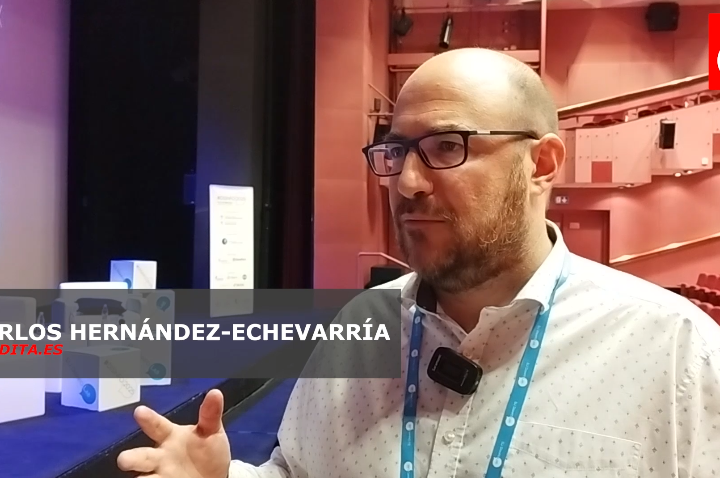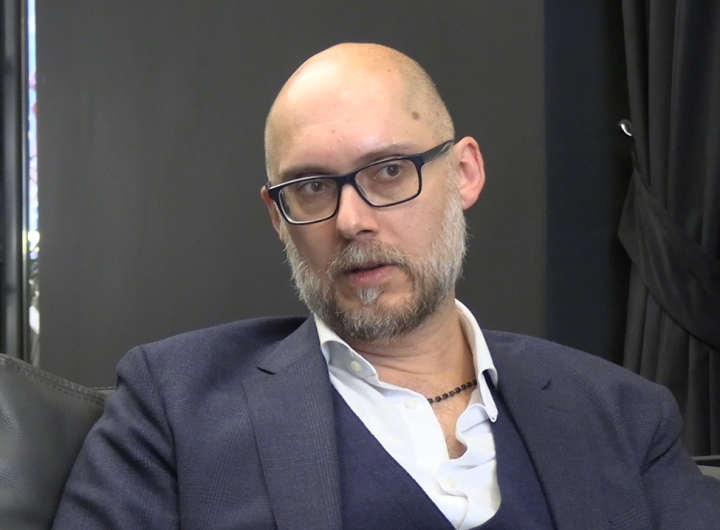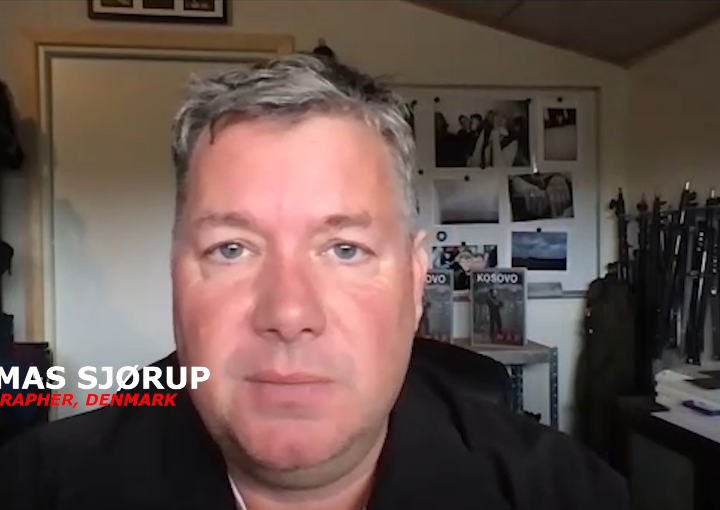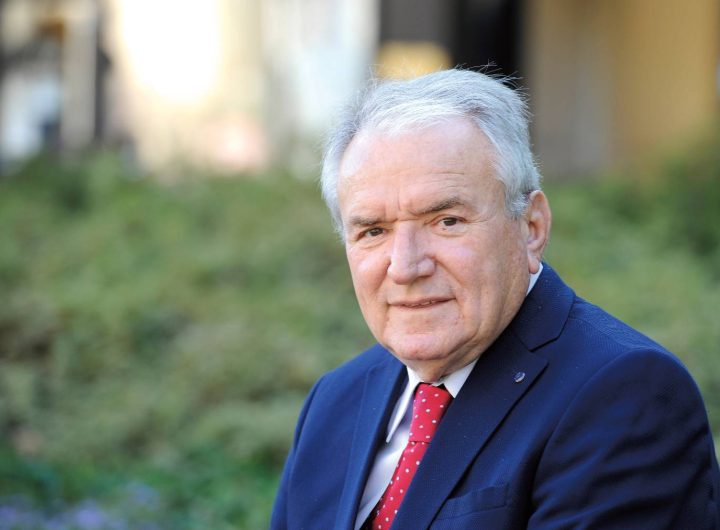
Recently, a Ukrainian translation of the book “Towards Justice: Strength and Survivors’ Stories” was presented in Pristina.
This publication was first published in Kosovo two years ago at the initiative of the Center for the Rehabilitation of Torture Victims under the leadership of Executive Director Feride Rushiti. In Ukraine, the book was published thanks to the support of the NGO UA Experts and the Pro Peace – Kosovo platform. In an exclusive interview with The Geopost, the founder and head of UA Experts, human rights activist Sergiy Nizhynskyi, spoke about cooperation between Ukraine and Kosovo at the level of non-governmental organizations.
Full interview here:
The Geopost: What is the significance of this project for the Ukrainian audience and for Ukrainian society?
Nizhynskyi: Thank you for your question and for your attention to this book. We devoted a year and a half to making it see the light of day in Ukraine. This is the time that was given to translators, literary editors to type and proofread very difficult material. After all, this is a book about the history of victims who 20 years ago in Kosovo experienced perhaps the most terrible thing that can happen in war – sexual violence.
These stories became an incentive for Ukrainian victims not to keep their problems quiet, to share with those who still remain in the occupied territories in Donetsk and Luhansk. This became such a good factor for many human rights activists to understand that everything needs to be systematized.
After all, one part of the aforementioned stories, collected by volunteers, is addressed to the Hague Tribunal. Another part of society understands that the work of psychologists is primarily case studies, understanding how to talk to victims, witnesses – both men and women, and children personally, using other examples. The publication of these stories and their recitation in the Diplomatic Academy, in the Lesya Ukrainka Library, in the parliamentary library proves that we need to tell as much as possible about those facts that are usually ashamed to talk about all over the world. After all, sexual violence during any armed conflict is the most silent crime. I hope that the translation of this book will help draw the attention of many people to the fact that it needs to be talked about. It is important to know how to react – from victims and witnesses to psychologists and lawyers and human rights activists who deal with this issue.
The Geopost: You rightly noted that documenting war crimes is a key and crucial element on the path to justice. Unfortunately, it took years for this in Kosovo. And what is the situation with documentation in Ukraine?
Nizhynskyi: Of course, we are guided by the report of the Human Rights Ombudsman of Ukraine, the reports of the UN Monitoring Mission, as well as the facts entered into the Unified State Register of Pre-Trial Investigations by the Office of the Prosecutor General of Ukraine. However, we understand that every month there are more facts. This is good, on the other hand, bad. Good, because more people understand what exactly acts fall under this type of crime. After all, they are verified, people receive relevant information through the media, the Internet, what exactly is the crime of sexual violence during war. In particular, forced undressing at checkpoints is the most common type of crime. This is the information that our society will really need.
On the other hand, this is negative information, because we see a real number of people who turn to law enforcement agencies after experiencing sexual violence. Some continue to keep silent about the crime and have the right to do so. Some, on the contrary, became a witness and want to talk about it. Some became victims. I have already said in the media that 70% of victims in Bucha are men. According to the report of the Verkhovna Rada Commissioner for Human Rights, the youngest victim is four years old, the oldest is 82. These figures emphasize the horror of this crime, about which we are trying to convey information to the general public. It is not for nothing that a separate, 11th column was provided in the register of losses of Ukraine for victims of sexual violence during the war. They have the right to reparations, compensation for damage and any other guarantees provided for persons who have benefits in connection with the war.
The only thing that matters is what benefits these people receive – that is our job as human rights activists and the Verkhovna Rada. We must verify them as much as possible, study the experience, in particular, of our neighbors – countries where there have already been wars, and improve it in order to provide maximum assistance to the aforementioned people.
It is not without reason that the UN Secretary-General’s Special Representative on Sexual Violence in War Pramila Patten noted that the successes that Ukraine has achieved in two years – meaning both at the level of legislation and at the level of human rights work – are incredible given the global context. Because there are more than 70 military conflicts in the world today, and not everywhere there are legislative mechanisms that exist in Ukraine: deepening and developing algorithms for compensation, prosecution, search, payments, creation of special funds, maximum assistance – from quotas in professions or access of children to schools and kindergartens. This is the work that the human rights sector in Ukraine does with maximum efficiency. For us, it is really both pleasant and important, and, we hope, it gives maximum practical benefit.
The Geopost: The UA Experts organization, which you created and lead, is making significant progress in this direction and is encouraging lawmakers to protect people who have suffered from sexual violence. Please tell us about your other initiatives.
Nizhynskyi: UA Experts was created in 2013, on July 4 we will be 12 years old. On the one hand, we were very inconvenient for the authorities – a kind of thorn in the side of civil society, because we constantly put pressure, voiced many issues. The full name of our organization is the Union of Anti-Corruption Experts. This suggests that UA Experts has an anti-corruption segment, and corruption activities are always afraid of publicity. Going into the public space with relevant facts, investigations (journalistic, legal, human rights) and project activities was not always convenient for the authorities.
We started by protecting the Automaidan activists who were injured by the police in 2013-2014. Then it became a kind of credo of help for us. We realized that there are many sources of untruth that need to be fought. After the start of the full-scale invasion in 2022, we realized that one of the most painful topics is sexual violence during war. And we don’t need the state and the authorities, and our international partners to keep quiet about it and say the standard phrase: “Well, this is war, this happens in all wars.” Yes, but Ukrainians will react to this and will definitely not remain silent. In addition to these projects, I think we have very successfully cooperated with the Ministry of Social Policy. We presented the demographic strategy of Ukraine. This is a huge project with a fund in the field of population with social services. We are trying to identify all possible problems that Ukraine faced during the war, during ecocide, genocide and many challenges, starting from the outflow of human capital and ending with the support of small and medium-sized businesses, in particular women’s. This mini-reconstruction fell on their shoulders, and working capital falls so that they can at least somehow support the economy.
And the third project is combating domestic violence. During the COVID-19 pandemic, we strengthened this direction, because in Ukraine the number of cases of domestic violence increased threefold. Now, during a full-scale war, the statistics are even worse. Therefore, this is a very important component. After all, in the courts of the city of Kyiv, family law is in the first place: divorce, alimony, – because of the war, because of social and household problems. People in difficult life circumstances react differently. And it is not only a husband and wife, but also elderly people, grandchildren. There is economic violence and psychological violence. This, accordingly, has consequences for the state, for the people. We need to react to this, create a caring society. Therefore, we are implementing many legislative initiatives as much as possible.
After ratifying the Istanbul Convention, we are trying to convey, in particular, in the regions, why it is important for Ukraine, that this is no longer just a prescription, it is already criminal liability. When we talk about joining the European Union, we must be ready for these things morally, ethically and practically. How to explain, for example, why the Istanbul Convention, which no one has heard of, is important for the region? We are talking about the fact that this is not only the implementation of our legislation, it is also the development of relevant policies that will be implemented and adapted to national legislation. This is important.
Because in some villages, for example, people are embarrassed to talk about it, because the head of the village council, the police, the head of the SBU, social insurance are acquaintances, relatives, and everyone knows each other. There is no secret who is the victim and who is the perpetrator. Everyone understands everything and lives with it.
Therefore, the involvement of mobile teams from other regions, the exchange, as well as the relocation of shelters from large cities, for example, to urban-type settlements, is all of great importance. This is our task – to help the state and social services.
The Geopost: I have heard from community representatives during trainings: “What kind of violence is this? She agreed to it herself”…
Nizhynskyi: Such examples of abuser and victim are reminiscent of the rhetoric of Russia and Ukraine. Russia, which commits a crime, kills people, and then gives interviews on top channels in the world that “we protect Russian-speakers” and so on. This very much reminds me of such an example between abuser and victim, because the abuser always blames the victim, even when his guilt is obvious.
The Geopost: Russian propaganda promotes the narrative that sexual violence is just a by-product of war, and not a genocidal strategy and a secret weapon designed to suppress a person’s will and destroy their personality. Does Ukraine have enough resources to collect all the evidence and bring the perpetrators to justice in international courts?
Nizhynskyi: You have very clearly stated how Russia manipulates these phenomena. Moreover, Russian propaganda is, unfortunately, one of the most powerful in the world.
And even residents not only of Russia, but of the whole world often believe this information.
There are other facts on the topic of sexual violence during the war. The Main Intelligence Directorate published a conversation between Russian soldiers and their wives on live broadcast on many TV channels, where the wife tells a soldier from Russia: “You kill, rape, everything will be forgiven you, give them, humiliate, demotivate” and so on. This once again confirms the fact that demoralization is the main goal of sexual violence for Russians. To humiliate, oppress, say that “you do not exist, there is no language, there is no faith”. Unfortunately, this was the case with our grandparents, who told the same story. Now we have understood this not only from books and legends, but also in real life.
This disinformation is intensifying. Seeing the huge informational and legal resistance of Ukrainians on the world stage, the Russians began to spread stories like: “Russian soldier Ivan fell in love with a Ukrainian woman and cheated on his Alenka” and similar narratives. This version is more understandable to Russians, who automatically support the aggression of their compatriots. They distort the facts of sexual violence, and instead come up with some stories of “betrayal” and violation of “values”. They blame Ukrainian women who were raped because they supposedly fight back their husbands. We must record these narratives and immediately comment on them in the media so that many people do not buy into these accusations of the aggressor.
The Geopost: Mr. Serhiy, I thank you for communicating. I am grateful to you for the efforts you are making to move this unmovable rock in our society. I hope that together the authorities, the public sector, and journalists will still be able to achieve justice.
Nizhynskyi: Thank you. In conclusion, I want to mention one story from the book that we translated under the coordination of Feride Rushiti and Korab Krasniqi. It is about how a man in Kosovo married a woman who suffered from sexual violence. How he tried to be with her every day, support, promote, and lobby her resume for various positions. This shows that love still conquers evil. I am sure that Ukrainians will stand up and defeat this evil. I am sure that many stories will be published from Ukraine, and the victims themselves will receive proper compensation, reparations, and support from the state.
I advise everyone who watches this interview to watch our short film about how sensitivity conquers violence. Where a woman thinks not about reparations, but about how to send her child to kindergarten in Ukraine, where electronic queues are everywhere. And how many privileged people, in particular the military, give up this place, emphasizing: this category of citizens should be heard and also have privileges in Ukraine.
The Geopost: A very inspiring example. Let it be so.
/The Geopost

 Russia is using disinformation to influence Western democracies
Russia is using disinformation to influence Western democracies  “Disinformation is becoming more sophisticated,” Alexandre Alaphilippe talks about global challenges and the role of AI
“Disinformation is becoming more sophisticated,” Alexandre Alaphilippe talks about global challenges and the role of AI  Paolo Palumbo: Russia is strengthening disinformation campaigns through artificial intelligence
Paolo Palumbo: Russia is strengthening disinformation campaigns through artificial intelligence  Professor Iztok Prezelj: Balkans influenced by external powers, Serbia serves as an entry point for Russia
Professor Iztok Prezelj: Balkans influenced by external powers, Serbia serves as an entry point for Russia  Kosovo through the lens, interview with the photojournalist of 1999
Kosovo through the lens, interview with the photojournalist of 1999  Djukic for The Geopost: There is a civil war in Serbia, the final outcome will be known in a few weeks
Djukic for The Geopost: There is a civil war in Serbia, the final outcome will be known in a few weeks